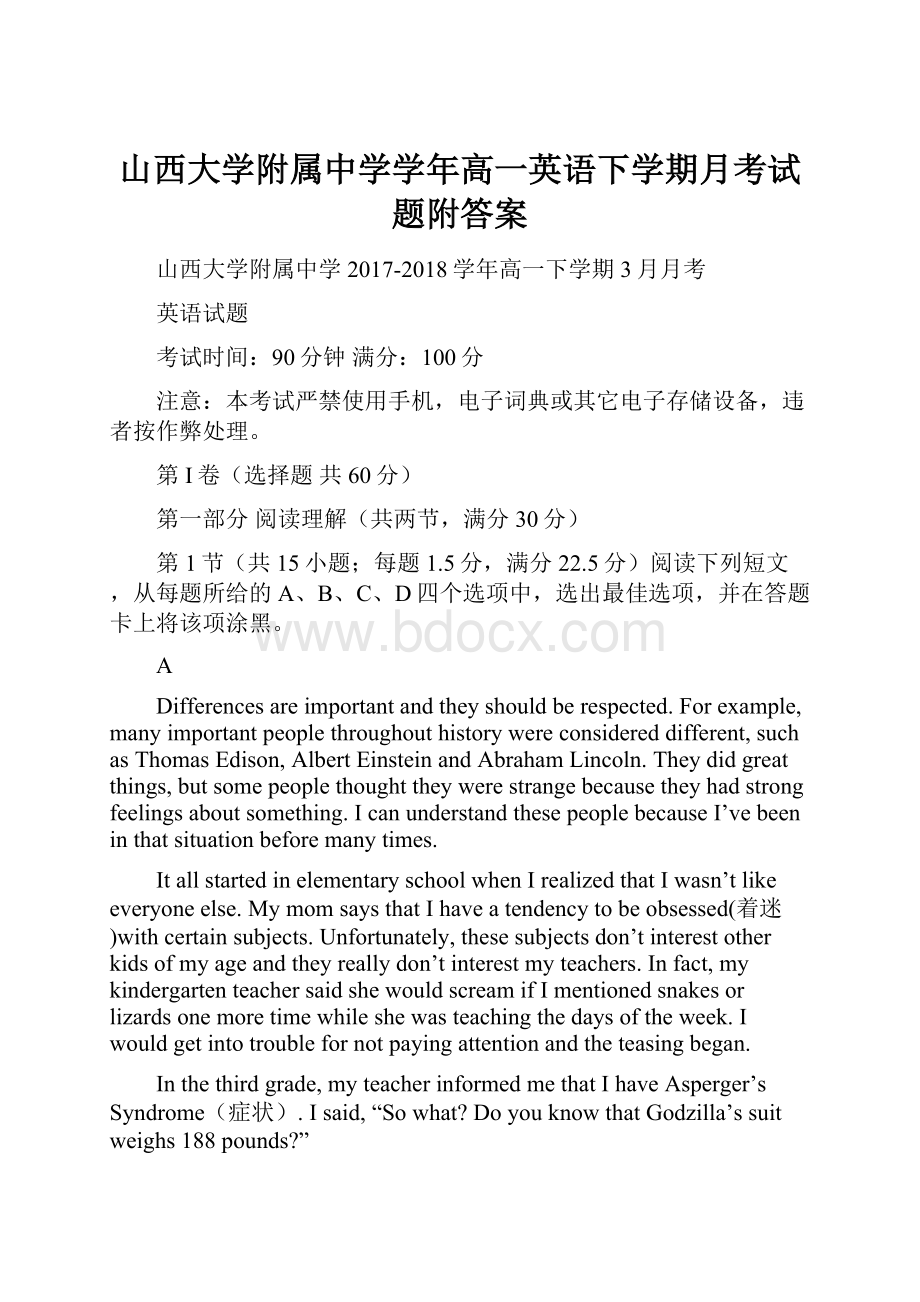山西大学附属中学学年高一英语下学期月考试题附答案.docx
《山西大学附属中学学年高一英语下学期月考试题附答案.docx》由会员分享,可在线阅读,更多相关《山西大学附属中学学年高一英语下学期月考试题附答案.docx(11页珍藏版)》请在冰豆网上搜索。

山西大学附属中学学年高一英语下学期月考试题附答案
山西大学附属中学2017-2018学年高一下学期3月月考
英语试题
考试时间:
90分钟满分:
100分
注意:
本考试严禁使用手机,电子词典或其它电子存储设备,违者按作弊处理。
第I卷(选择题共60分)
第一部分阅读理解(共两节,满分30分)
第1节(共15小题;每题1.5分,满分22.5分)阅读下列短文,从每题所给的A、B、C、D四个选项中,选出最佳选项,并在答题卡上将该项涂黑。
A
Differencesareimportantandtheyshouldberespected.Forexample,manyimportantpeoplethroughouthistorywereconsidereddifferent,suchasThomasEdison,AlbertEinsteinandAbrahamLincoln.Theydidgreatthings,butsomepeoplethoughttheywerestrangebecausetheyhadstrongfeelingsaboutsomething.IcanunderstandthesepeoplebecauseI’vebeeninthatsituationbeforemanytimes.
ItallstartedinelementaryschoolwhenIrealizedthatIwasn’tlikeeveryoneelse.MymomsaysthatIhaveatendencytobeobsessed(着迷)withcertainsubjects.Unfortunately,thesesubjectsdon’tinterestotherkidsofmyageandtheyreallydon’tinterestmyteachers.Infact,mykindergartenteachersaidshewouldscreamifImentionedsnakesorlizardsonemoretimewhileshewasteachingthedaysoftheweek.Iwouldgetintotroublefornotpayingattentionandtheteasingbegan.
Inthethirdgrade,myteacherinformedmethatIhaveAsperger’sSyndrome(症状).Isaid,“Sowhat?
DoyouknowthatGodzilla’ssuitweighs188pounds?
”
Later,Iaskedmymom,“What’sAsperger’sSyndrome?
AmIgonnadie?
”Shesaidthatit’slikehavingblinderson,andthatIcanonlyseeonethingatatime,andthatit’shardtofocusonotherthings.
Peoplealsomakefunofmeforknowingfactsaboutvolcanoes,whales,tornadoesandmanyotherscientificthings.MymomsaysthatshehasbeenabletoanswermanyquestionsonJeopardy!
justbylisteningtowhatIhavetosay,butI’veevenbeenlaughedatforbeingsmart.
MaybesomedayI’llbecomeageneengineerandcreatetherealGodzilla.Icandream,Can’tI?
1.WhydoestheauthormentionpeoplelikeAlbertEinstein?
A.ToexaminedifferencesB.Toshowhisadmiration
C.TomakecomparisonD.Tosupporthisidea
2.Howdidthekindergartenteacherfeelabouttheauthor?
A.AngryB.WorriedC.SorryD.Curious
3.What’sJeopardy!
mostprobably?
A.It’saprogramintendedforyoungkids.B.It’saquizshowcoveringvarioustopics.
C.It’sanoveltellingaboutadventurestories.D.It’samagazineaboutscientificdiscoveries.
B
Themoreinterestedyouareinatopic,themorelikelyyoumaybetoform“falsememories”abouttheeventsrelatedtothattopic.
“Mostpeopleareprettyconfidentabouttheirownmemoryforsomeevents,butnewresearchshowsthatfalsememoryisalotmorefrequentthanmanypeoplerealize.Intermsofdailylife,thekeypointheremaybetounderstandthatsomeonewhoremembersaneventdifferentlyfromyoursisn’tnecessarilylying—someone’smemorymaybefaulty,oritmightbeyou,”saidstudyco-authorCiaraGreene,apsychologistattheuniversityCollegeDublin.
Inthestudy,theresearchersasked489peopletoreadfournewsstoriesabouteventsthatwererelatedtothetopicstheyrankedasthemostinteresting,andfourstoriesabouteventsrelatedtothetopicstheyratedastheleastinteresting.Ineachcase,threeoftheseeventsreallydidoccur,butthefourthonewasmadeup.
Itturnedoutthatpeopletendedtorememberthestoriesofthetopicstheysaidtheyweremoreinterestedincomparedwiththetopicstheywerenotinterestedin.However,theparticipantsalsotendedtostoremorefalsememoriesrelatedtothetopicstheywereinterestedincomparedwiththetopicstheywerenotinterestedin,theresearchersfound.
Themorepeopleknowaboutatopic,themorememoriesrelatedtothistopictheyhavestoredintheirbrains,theresearcherssaid.Therefore,whenapersonmeetsnewinformationonthistopic,thatinformationmayfindtracesofsimilarmemoriesthathavealreadystoredinthebrain,Greenesaid.
“Thiscanresultinasenseoffamiliarityorrecognitionofthenewmaterial,leadingtotheconviction(确信)thattheinformationhasbeenmetbeforeandisinfactanexistingmemory,”Greenesaid.Inotherwords,thisnewmaterialorinformationmay“feel”familiarandthereforethepersonmaybelieveitmustbetrue,hesaid.
Learningmoreabouthowfalsememoriesworkmayhelpprotectagainsttheharmfulresultsofthem,suchaswheneyewitnessaccounts(证言)ofcrimesarefaulty.
4.WhatCiarasaidinParagraph2suggeststhatyoushouldn’t_________.
A.forgetthefrequencyoffalsememory.B.lietosomeonewithdifferentmemories.
C.believefaultymemoriesofotherpeople.D.completelytrustyourmemory.
5.Inthestudy,peoplewhowereinterestedinatopic________.
A.werelesslikelytoformfalsememoriesrelatedtoit
B.tendedtorememberfalseinformationaboutit
C.couldrememberanyinformationaboutiteasily
D.wantedtoknowmoreaboutit
6.What’sthemainideaofthetext?
A.Theharmoffalseinformation.
B.Whypeoplehaveapoormemory.
C.Interestingtopicsmayleadtofalsememories.
D.Howtomakeagoodmemoryforsomeevents
C
Inthestoryof“ThecrowandthePitcher”fromAesop’sFables,athirstycrow(乌鸦)dropsstonesintoanarrowjartoraisethelowlevelofwaterinsidesohecantakeadrink.
Nowscientistshaveevidencetobackupthatstory.NewCaledoniancrowsactuallydounderstandhowtomakewaterdisplacementworktotheiradvantage,experimentsshowed.Theresultssuggestthatthebirdsare,atleastinsomeaspects,assmartasfirst-graders,accordingtothestudy.
Researchers,ledbySarahJelbertattheuniversityofAucklandinNewZealand,presentedsixcrowswithtubesfilledwithwater.Insidethetubes,awormorpieceofmeatonapieceofwoodwasfloating,justoutofreachofthecrow.Infrontofthetubes,theresearchersarrangedabunchofheavyrubbererasersthatwouldsink,andlightplasticobjectsthatwouldfloat.Thecrowsfoundoutthattheycoulddroptheheavyobjectsintothetubesinordertoraisethewaterlevelandgettheirsnack.
However,thebirdshandledawkwardlyinexperimentsinwhichtheycouldchoosetodropobjectsineitherawidetubeoranarrowtubetogetasnack,theresearcherssaid.Droppingobjectsintonarrowtubewouldliftthewaterlevelbyagreateramountandputthetreatwithinreachafterjusttwodrops.Incontrast,ittookaroundsevendropstoraisethesnacktothesamelevelinthewidetube.Thecrowsobviouslydidn’trealizethis,andmostofthemwentforthewidetubefirst.
Previousstudiesshowedthatchimpsandhumanchildrencansolvesimilartasks.Ina2011study,chimpsandkidsfoundoutthattheycouldputwaterintoatubetoreachapeanutthatwasfloatinginsmallamountofwateratthebottom.
7.Whatdoesthetextfocuson?
A.Aesop’spredictionB.Crow’sintelligence
C.ThedevelopmentofcrowsD.Human-animalcommunication
8.HowdidthecrowsgettheworminatubeinSarah’experiment?
A.Bydroppingintheheavyerasers.B.Byremovingtheplasticobjects.
C.Bystandingonthewood.D.Bybreakingthetube.
9.Whatdoestheunderlinedpart“thetreat”inParagraph4referto?
A.Thetube.B.Theobject.C.ThesnackD.Thewater.
10.Whatdidtheexperimentwithwideandnarrowtubesshow?
A.Crowsaresensitivetosurroundings.
B.Crowshavetheabilitytorecognizeshapes.
C.Crowsareclevererthanchimpsandchildren.
D.Crowsunderstandwaterdisplacementincompletely.
第二节(共5小题;每小题1.5分,满分7.5分)
根据短文内容,从短文后的选项中选出能填入空白处d的最佳选项。
选项中有两项为多余选项。
Howtoberealistic
Inordertoberealistic,youmustunderstandyourselfandtheworldaroundyou.11________Youstillneedtochallengeyourself,butifyouhavetriedsomethingseveraltimes,thenyouneedtoacceptthatmaybeyoucan’tdoit.Keepyourselffirmlyonthegroundandreadon.
12________Trynewthingsanddoyourbestatthem,butifyoufindthatitissomethingyoucan’tdoaftermanytries,acceptthefailuresandberealistic.
Explaintoothersthatyouarebeingrealisticinyourapproach.Whenyouhitthewall,backoff.Youcan’tcontinuetobangyourheadagainstthewall.13________Somepeopledon’tacceptthem,buttheyarethere.
Challengeyourself.Youneedtotrybeforeyoucanberealisticandsay,“Ican’tdothat.”Nooneevergotanywherewithouttrying.14________Sometimesyouneedtofindtheonethatworksforyou.
Followwhatyoubelieve.Peoplemaytellyouthatyoucandosomethingifyoutryhardenough,andsometimestheyareright.Butifyouknowthatyoucan’tdoit,followwhatyoubelieve.
Seewhatisthere.Youdon’tneedtoanalyzeeverything.Don’tlookbelowthesurface.15________Alwaysexpectwhatyouknowtoberealistic.Don’tlookformiracles.
A.Everyonehaslimitations.
B.Approachliferealistically.
C.Justtakeeverythingatfacevalue.
D.Youcanberealisticandjustgowiththeflow.
E.Manythingscanbeachievedindifferentways.
F.Understandwhatyoucandoandwhatyoucan’t.
G.Youmustbeabletoseeexactlywhatyouarecapableof.
第二部分英语知识运用(共两节,满分45分)
第1节完形填空(共20小题;每小题1.5分,共30分)
OnecoldDecembermorning,mydadandIwerewalkingalongtheroadtoastoretobuyChristmaspresents.Suddenlyacarrantousoutof16._____.Pushedawaybymydad,Iwas17._____whilehewasunabletoescapeandinjured.Mydad18._____unconditionallovetomewhenfacedwiththeaccident.Sincethatday,Ihave19._____thepowerofloveandthe20._____itcanteachtothosewhotakeanythingforgranted,asIdideverythingbefore.
Peoplewanderintoourlivesforvariousreasons,buteachonehassomethingto21._____,eventhedriverwhocausedthe22._____.Hehelpedmealot.Whetherour23._____isentirelygoodornot,thereremainssomethingtobegainedfromeverypersonwe24._____.Ihavecometoview